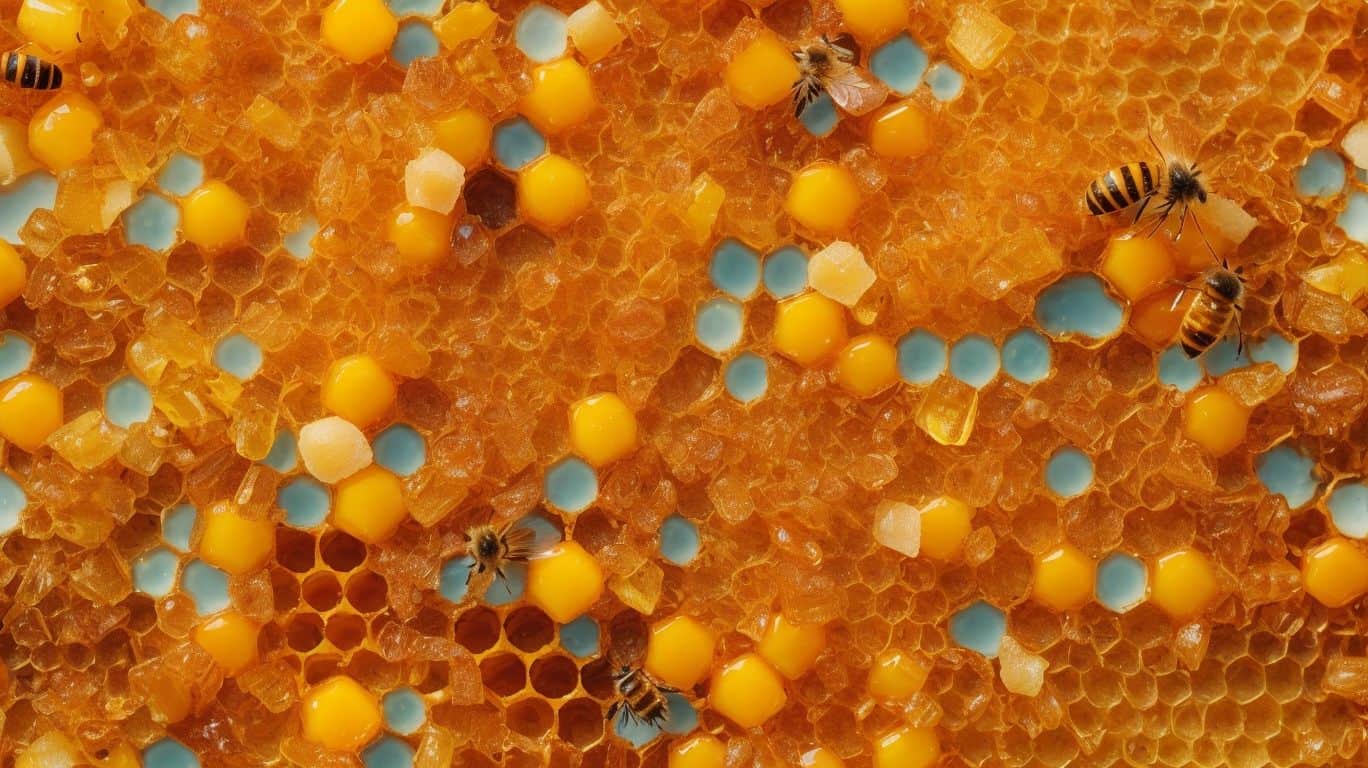Are you looking to make healthier choices but confused about the differences between honey and sugar? You’re not alone.
With an increasing focus on nutrition and wellness, it’s important to understand the nuances and benefits of various sweeteners. Dive into this article to unravel the mysteries of honey and sugar.
What Are the Nutritional Differences Between Honey and Sugar?
Honey and sugar are two popular options when it comes to sweetening our food and beverages. However, these two sweeteners differ not only in taste, but also in their nutritional profiles.
In this section, we will take a closer look at the nutritional differences between honey and sugar.
We will explore the calorie content, carbohydrate composition, and presence of vitamins and minerals in each sweetener.
By the end of this section, you will have a better understanding of how these two sweeteners compare in terms of nutrition.
1. Calories
Calories are an important consideration when comparing honey and sugar. Here are some key points about calories:
- Honey:
- Contains approximately 64 calories per tablespoon.
- Serves as a natural source of energy due to its natural sugars.
- Can be used as a substitute for sugar in recipes, reducing overall calorie intake.
- Sugar:
- Contains about 49 calories per tablespoon.
- Provides empty calories as it lacks nutritional value.
- Consuming excessive amounts of sugar can lead to weight gain and associated health issues.
2. Carbohydrates
Carbohydrates are essential components found in both honey and sugar. Honey is mainly made up of carbohydrates in the form of fructose and glucose, making up approximately 82% of its composition.
This makes honey a high-energy food. On the other hand, sugar is made up entirely of sucrose, a type of disaccharide comprised of glucose and fructose. It is composed of 100% carbohydrates.
While honey’s carbohydrates also contain trace amounts of vitamins, minerals, and antioxidants, sugar lacks any additional nutritional benefits.
Therefore, in terms of carbohydrates alone, honey and sugar have similar amounts, but honey offers additional nutrients.
3. Vitamins and Minerals
Vitamins and minerals are crucial nutrients that are necessary for maintaining overall health and well-being. When comparing honey and sugar, there are some differences in their vitamin and mineral content.
- Honey: While honey does contain small amounts of vitamins and minerals, the levels can vary depending on the floral source of the honey. Some common vitamins and minerals found in honey include vitamin C, calcium, and iron.
- Sugar: On the other hand, refined sugar does not contain any significant amounts of vitamins or minerals. The refining process removes these nutrients, leaving behind empty calories.
Throughout history, humans have recognized the importance of vitamins and minerals in their diet. Ancient civilizations valued certain foods for their health benefits.
For example, the ancient Egyptians believed in the medicinal properties of honey and used it as a natural remedy for various ailments. This reverence for the nutritional value of honey continues to this day.
What Are the Health Benefits of Honey?
When it comes to natural sweeteners, honey is often praised for its numerous health benefits. In this section, we will explore the specific ways in which honey can positively impact our health.
From its antioxidant properties to its antibacterial and anti-inflammatory effects, we will examine the various benefits that honey offers.
Additionally, we will discuss its potential to help with allergies, making it a popular choice for those seeking natural remedies.
Get ready to learn how honey can be more than just a delicious alternative to sugar.
1. Antioxidant Properties
Antioxidant properties are among the many health benefits of honey. These properties act as a defense mechanism for the body against harmful free radicals. Here are the steps that demonstrate how honey exhibits its antioxidant properties:
- Honey contains a variety of antioxidants, including phenolic compounds and flavonoids.
- These antioxidants work to counteract free radicals, which can lead to oxidative stress and chronic diseases.
- Research has shown that honey has a higher antioxidant capacity compared to other sweeteners, such as sugar.
- The specific types and amounts of antioxidants found in honey may vary depending on factors such as the source of the flowers and the methods used for processing.
- Incorporating honey into your diet on a regular basis can contribute to your overall antioxidant intake and promote good health.
Adding honey to your meals can be a delicious way to boost your antioxidant intake and support your overall well-being.
2. Antibacterial and Anti-inflammatory Effects
The antibacterial and anti-inflammatory properties of honey make it a more desirable alternative to sugar. Honey contains hydrogen peroxide, a natural antibacterial agent that can effectively combat harmful bacteria.
Additionally, it possesses anti-inflammatory capabilities that can help reduce inflammation within the body. In contrast, sugar lacks these beneficial effects and may even contribute to inflammation and the proliferation of harmful bacteria.
Therefore, when evaluating the health benefits, honey is the superior choice due to its antibacterial and anti-inflammatory effects.
3. Potential to Help with Allergies
Honey has the potential to help with allergies due to its anti-inflammatory and antibacterial properties. Here are some steps to consider when using honey for allergies:
- Choose raw, unfiltered honey to ensure it contains pollen and other beneficial compounds.
- Start by consuming a small amount of honey daily, gradually increasing the dosage over time.
- Select local honey, as it may contain pollen from local plants that may trigger allergies.
- Consider using honey as a natural sweetener in tea or other beverages.
- Consult with a healthcare professional before using honey as a remedy for allergies, especially if you have specific allergies or medical conditions.
What Are the Health Risks of Consuming Too Much Sugar?
Sugar is a common ingredient found in many of our favorite foods and drinks. However, consuming too much sugar can have detrimental effects on our health. In this section, we will discuss the potential health risks of consuming excessive amounts of sugar.
From weight gain and obesity to an increased risk of type 2 diabetes and negative impact on heart health, we will explore the different ways that sugar can negatively affect our bodies.
By understanding these risks, we can make more informed choices about our sugar intake.
1. Weight Gain and Obesity
Weight gain and obesity are serious concerns that have been associated with consuming excessive amounts of sugar. To address this issue, here are some steps that can be taken:
- Monitor your sugar intake by reading food labels and being mindful of hidden sugars.
- Reduce added sugar in recipes by using natural sweeteners such as honey or fruit puree.
- Control portion sizes and limit the consumption of sugary drinks and desserts.
- Incorporate regular exercise into your routine to burn calories and maintain a healthy weight.
- Seek guidance from a healthcare professional or nutritionist for personalized advice and support.
The rise in obesity rates over the past few decades has been linked to the increased consumption of sugary foods and beverages. This has led to a growing awareness of the negative impact of excessive sugar intake on weight management and overall health.
By taking steps to reduce sugar consumption and maintain a balanced lifestyle, one can prevent weight gain and reduce the risk of obesity-related health issues.
2. Increased Risk of Type 2 Diabetes
Having an excessive amount of sugar in your diet can heighten the possibility of developing type 2 diabetes. To decrease this risk, follow these steps:
- Limit your consumption of sugary foods and beverages.
- Choose healthier alternatives such as fresh fruits or unsweetened drinks.
- Check food labels to identify hidden sources of sugar.
- Opt for whole foods and homemade meals to have better control over added sugars.
In a true story, Sarah reduced her sugar intake and incorporated more balanced meals. As a result, she experienced weight loss and improved her blood sugar levels, ultimately lowering her risk of developing type 2 diabetes.
3. Negative Impact on Heart Health
A high intake of sugar has been linked to negative effects on heart health. Excessive consumption of sugar can lead to weight gain and obesity, which are risk factors for heart disease.
It can also increase the risk of developing type 2 diabetes, which is associated with an increased risk of heart disease.
Additionally, consuming too much sugar can have a negative impact on heart health by contributing to high blood pressure and inflammation.
Therefore, it is crucial to moderate sugar intake and consider healthier alternatives like honey, which has natural sweetening properties and potential health benefits for the heart.
Can Honey Be a Healthier Alternative to Sugar?
When it comes to sweeteners, honey and sugar are two of the most commonly used options. However, there are notable differences between the two that can impact our health.
In this section, we will explore whether honey can be a healthier alternative to sugar.
We will discuss the nutritional benefits of honey as a natural sweetener, its lower glycemic index compared to sugar, and its ability to enhance the immune system.
These factors make honey a unique and potentially beneficial substitute for sugar in our diets.
1. Natural Sweetener with Nutritional Benefits
- Choose raw and unprocessed honey, as it contains more nutrients.
- Substitute honey for sugar in recipes, adjusting the amount to achieve the desired level of sweetness.
- Take advantage of honey’s antioxidant properties, which can help protect against cellular damage.
- Benefit from honey’s antibacterial and anti-inflammatory effects, which may aid in wound healing and support immune function.
- Consider the potential of honey to alleviate allergies, as local honey may contain small amounts of pollen that can desensitize the body.
2. Lower Glycemic Index
A lower glycemic index is one of the advantages of using honey as a sweetener compared to sugar. Here are some key reasons why honey has a lower glycemic index:
- Fructose content: Honey has a higher fructose content compared to sugar, which results in a slower absorption rate in the bloodstream.
- Fiber content: Honey contains small amounts of fiber, which further slows down the absorption of sugars.
- Processing and refining: Sugar undergoes extensive processing, resulting in a higher glycemic index, while honey is less processed.
These factors contribute to honey having a lower glycemic index, making it a better option for individuals looking to manage blood sugar levels.
3. Ability to Enhance Immune System
Boosting the immune system is a crucial aspect of maintaining overall health. Here are some steps to improve your body’s ability to fight off illnesses:
- Consume a well-balanced diet that includes plenty of fruits, vegetables, whole grains, and lean proteins.
- Stay hydrated by drinking an adequate amount of water.
- Incorporate regular exercise into your routine to strengthen your immune system.
- Make sure to get enough sleep to allow your body to repair and regenerate.
- Manage stress levels through relaxation techniques or engaging in enjoyable activities.
Pro-tip: Boost your immune system even further by including foods such as citrus fruits, garlic, ginger, and yogurt in your diet.
Frequently Asked Questions
What is the main difference between honey and sugar?
Honey is a natural, unprocessed sweetener produced by bees, while sugar is a refined sweetener derived from sugarcane or sugar beets.
Is honey healthier than sugar?
Yes, honey is considered a healthier option than sugar as it contains antioxidants, vitamins, and minerals, while sugar has no nutritional value.
How do honey and sugar differ in taste?
Honey has a distinct floral taste and can vary in flavor depending on the type of flowers the bees used. Sugar has a sweet taste with no distinctive flavor.
Can honey and sugar be used interchangeably in recipes?
Yes, honey and sugar can be used as sweeteners in recipes, but the texture, taste, and amount used may differ. Honey is sweeter than sugar, so less honey is needed to achieve the same level of sweetness.
Is one better for baking – honey or sugar?
Sugar is typically the preferred sweetener for baking as it provides structure and texture to baked goods. However, honey can also be used in baking, but the recipe may need to be adjusted for the added moisture and sweetness.
Which is more environmentally friendly – honey or sugar?
Honey is considered more environmentally friendly as it is a natural product and does not require the industrial processes involved in producing sugar. Honey production also supports the important role bees play in pollination.
I’m a Manuka honey enthusiast and creator of Manuka Honey Organic, a blog where I share my journey with authentic Manuka honey from New Zealand. I want everyone to learn about the healing powers of Manuka honey.





